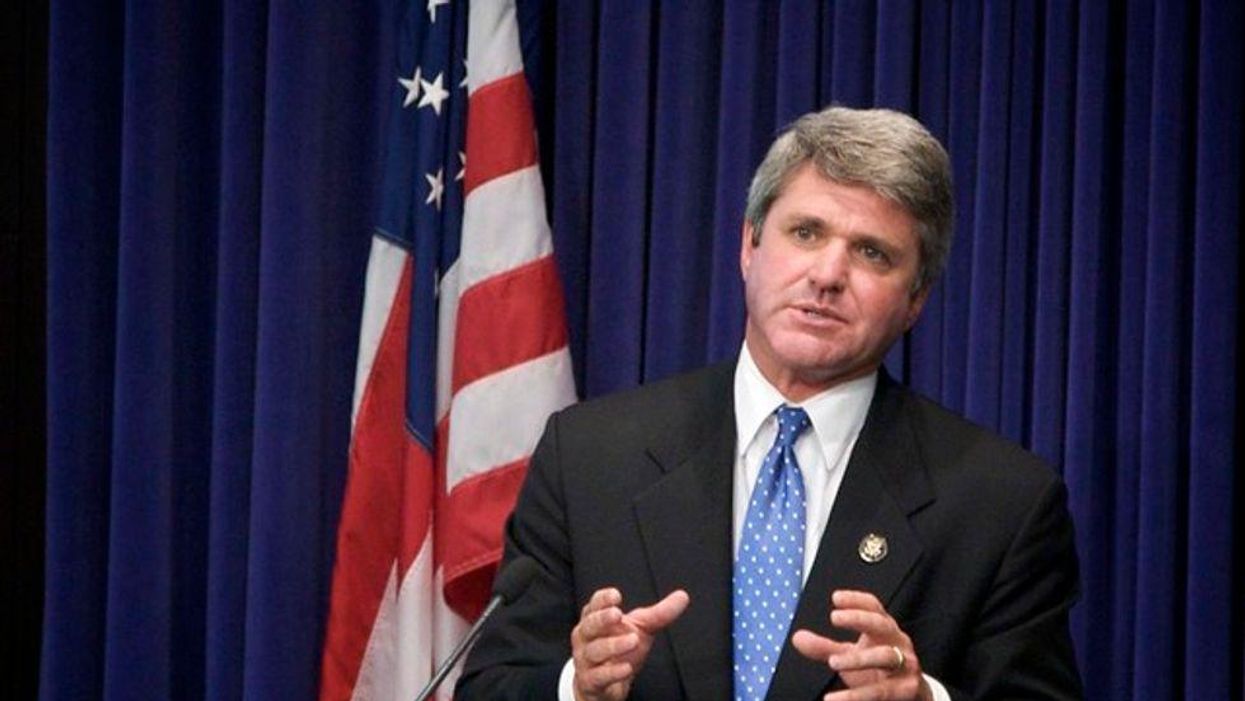Democrats Should Be the Party Of Social Security -- Not On Social Security
Remember last June, as the growing anxiety about President Joe Biden’s age gave way to a stomach-churning post-debate transition to a Kamala Harris candidacy? I do, and the Biden camp made two arguments unrelated to the President’s obvious infirmity. The first was that it was simply too late to swap in a new candidate, something that may have been true: Harris lost an election that she might have won if given more than 100 days, or a primary season, to frame a candidacy.
The other argument was that in the United States, incumbency is king. That was trickier, since for the first time since the 19th century, there were, in a sense, two incumbents: when Biden relinquished his candidacy to Harris, Trump became the closest thing to an incumbent in the race. Incumbency carries candidates over the line, not because they are the best candidates, but because they are the best-known candidates. The fact that Strom Thurmond (R-SC) died as a Senator in 2003, or Dianne Feinstein in 2023, both visibly in the grip of dementia, had everything to do with the power of incumbency. People who saw what the rest of us saw voted for them anyway.
On the other hand, you could also see 2024 as a wide-open race with no incumbents—and maybe that’s the kind of race Democrats should learn to run if they want a more youthful, nimble, and relevant party. So, what if the Democrats stopped running candidates in their 70s and 80s, and gave younger people a chance?
I am thinking about this because of the angst out there about New Hampshire Democrat Jeanne Shaheen’s decision, announced yesterday, not to run for re-election to the Senate in 2026. In true New England style, she offered little explanation other than: “It’s just time.” This is another way of saying: I am 78, for God’s sake: what more can you possibly want from me?
The fact that Donald Trump is also 78; and that seven Senators who have not announced their retirement are 78 or older, including Chuck Grassley (90, R-IA) and Bernie Sanders (82, I-VT), makes the idea that Shaheen would serve until she was 84 seem reasonable. In a true national emergency, Shaheen’s decision is “A blow to Democrats,” headline blares. In the New York Times, long-time Granite State watcher Felice Belman warns of a “high-stakes race in a state whose voters are famously fickle.”
But Shaheen knows what she is doing. “I think 2026, given where I think the country’s going to be, and New Hampshire is going to be,” she told Senator reporter Burgess Everett, “it should be a good year to hold on to the seat.” Translation: Donald Trump is driving the country into a ditch, and it is going to hit New Hampshire very hard; if I step back now, the Democrats can nail down this seat for the next two decades.
Listen to her, Democratic leadership. The first woman to serve both as governor of a state and as one of its Senators, Shaheen has been in politics for half a century; and when she retires, in the Senate for almost a quarter century.
Shaheen is speaking not so indirectly to a huge problem for Democrats: the party sorely needs a youthful makeover. It needs a leadership cohort whose ascent to the Senate doesn’t pre-date the browsable internet, cable news, cell phones, social media. It needs a deep Senate bench for key committees, like Shaheen’s Foreign Affairs committee.
New ideas don’t come out of old bottles, but frankly, the Democrats also just need a new look. Politics is more telegenic than ever, and frankly, too much of the Democratic leadership is not TikTok-able. Good as he is at the job, 74-year-old Minority Leader Chuck Schumer has virtually no neck anymore, and 82-year-old Bernie Sanders presents as a shouty old guy. How does this inspire people in their 20s and 30s? Worse, the longer they stay, the more the talent in their states does not have a viable shot at power and influence.
You know who would make a great Senator from Vermont? Congressperson Becca Balint. She’s 57, an out lesbian, and we know she can win a statewide race because Vermont only has one Representative. You know who would make a great Senator from New York? Representative Alexandria Ocasio-Cortez.
But back to Shaheen’s decision: Yes, an incumbent stepping away is always a risk, and New Hampshire is a tricky state: its voters are highly independent, they love to split their tickets, and of course the Democrats could lose the seat. A very popular former Republican Governor, Chris Sununu, might run, and would be favored as the only person in the state’s history to be re-elected three times. Only 50, Sununu currently seems to be resting.
Legendarily coy about his plans, he is undoubtedly aiming at a presidential run in 2028, and two years as a Senator doesn’t help him do that. The downside to a Sununu candidacy is his family history as Bush Republicans and the moderate record (yes, signing a 24-week abortion ban definitely makes you a moderate in today’s GOP) that makes him good primary material in New Hampshire, but not in Texas or Florida.
Other candidates? There’s some buzz that a perennial bridesmaid, the border-hopping 65-year-old Scott Brown will declare. A former nude Cosmo centerfold, Brown was boosted into the late Democrat Ted Kennedy’s seat by the Tea Party Express in a 2010 special election. Those are almost the only two things Brown has ever done, or had a chance to do: he was pantsed in 2012 by law professor Elizabeth Warren, who came back from an eight-point deficit to win by almost as much. In 2014, Brown then ran against Shaheen in New Hampshire in 2014, and lost again, this time by three points.
So, in addition to Brown being the first male Senator to pose nude, he also became the first man in American history to lose Senate races to two different women. “When you write the stories, please write that he colors his hair, and I don’t,” Shaheen told Everett; “his big accomplishment is he coaches a women’s basketball team, and it’s in Massachusetts.”
But Shaheen’s retirement is important for a bigger reason. We must stop treating every Democratic Senator as irreplaceable, regardless of age, and retirements as unacceptable risks.
To be explicit? there is a youth revolution going on in the GOP, and not in the Democratic Party. If Democrats do not get younger and become more knowledgeable about what younger voters want and need, they will consign themselves to irrelevance for decades to come. One thing that the lack of general horror about Elon Musk destroying the government reveals (a Harvard poll cited by White House spokesbimbo Karoline Leavitt says that as many as 76% of Americans approve of the DOGE project), it is that Americans are frustrated with a government that has been in irons for several decades.
Democrats do believe in an administrative and regulatory state, and it is what distinguishes them from a GOP taken over by libertarian populists and corporations. But what Democrats haven’t done in recent years is build a better state that can meet the moment, as opposed to reforming the basic structure. Barack Obama’s 2009 economic package and his 2010 Affordable Care Act, as well as “Bidenomics” were really patches to, and revivals of, New Deal and Great Society policies. From the vantage of Trumpism, these policies look like liberalism’s dying gasp—not its next, bright, chapter.
In other words, we Democrats forgive student loans; we don’t fundamentally restructure and rethink education. We expand healthcare, but we don’t make it affordable or available (current wait time for a primary care provider in Western Mass? Eight months.) We say we will build houses so that middle-class people can own them, not so working people can rent them and still pay for food, clothing, and the occasional night out. We want to preserve and expand Medicare, but we don’t have a clue how to find the workers that elderly people need to support them.
Democrats’ insistence on running candidates who are well beyond conventional retirement age does not inspire confidence that they are open to new ideas. It’s worth noting that part of the disbelief about Shaheen stepping back is that, in the scale of the Senate, at 78, she only looks a little over the hill. The median age of this body is 64.7, down six months since 2022, while the median age of Democratic Senators is slightly higher at 66.
The most progressive states also have some of the worst records when it comes to leaving aging Senators in place. Take my own state, Massachusetts. Barring illness or death, my Senator, Elizabeth Warren (who I adore) will serve until she is 81; while my other Senator, Ed Markey (who I like), will seek a third term in 2026 when he will already be 80.
You know who would be great Senators? The current governor, Maura Healey (54); Congressman Jim McGovern (65—particularly since Hakeem Jeffries, who is 54, is locked in as House Leader); Boston Mayor Michelle Wu (40); and Congresswoman Ayanna Pressley (51). The talent in my state is bottomless, and like California, the path to policy power is very narrow.
That path narrows even further when we are talking about a Senate race. Why? They are statewide, so it’s hard for people successful at the district level to make themselves well-known. They are expensive, so candidates who already have significant accomplishments, either electoral or in business, are most likely to win because wealthy donors like people who are successful already.
This is why Democrats wanted Shaheen—who is moderate, popular, accomplished, and brought the Democratic Party back to life in New Hampshire—to run again. None of the Democratic representatives who will duke it out in a primary have a statewide reputation, and the party, unlike the GOP, doesn’t seem to have a deep back bench of carpetbagging, self-funding hedge funders to port around the country.
In our tightly polarized country that no longer sees huge swings in the House or the Senate, running incumbents is good defense against Trump’s six-seat GOP majority. Even though the Republicans still need seven Democrats for a cloture vote (see: the Republican spending bill currently on life support in the Senate), a viable Democratic majority seems out of reach. The party to claw back three seats in2026 just to get Vice President JD Vance off his ample rump to cast a tiebreaker. It would take four seats to win the majority back, retake all those chairmanships, and then—only then—imagine the process of winning the hearts and minds of nine Republican Senators to move legislation.
But it’s the fact that majorities have been so tight for years that put us in this place to begin with. Twice, a Democratic House brought Donald J. Trump’s impeachment to the Senate, and twice, because Republicans have no moral compass, it failed. So here we are, not just with Donald Trump as President again, but with Elon Musk and a Cabinet of Looney-Tunes characters ripping the government apart like so many Tinker Toys.
Democrats don’t have to accept a democracy perpetually lived on the brink of disaster, but in order to create something else, they may have to stop playing defense, and attack.
Let a younger generation have its shot.
Claire Bond Potter is a political historian who taught at the New School for Social Research. She is a contributing editor to Public Seminar and wrote the popular blog Tenured Radical from 2006 through 2015. Please consider subscribing to Political Junkie, her Substack newsletter.
Reprinted













